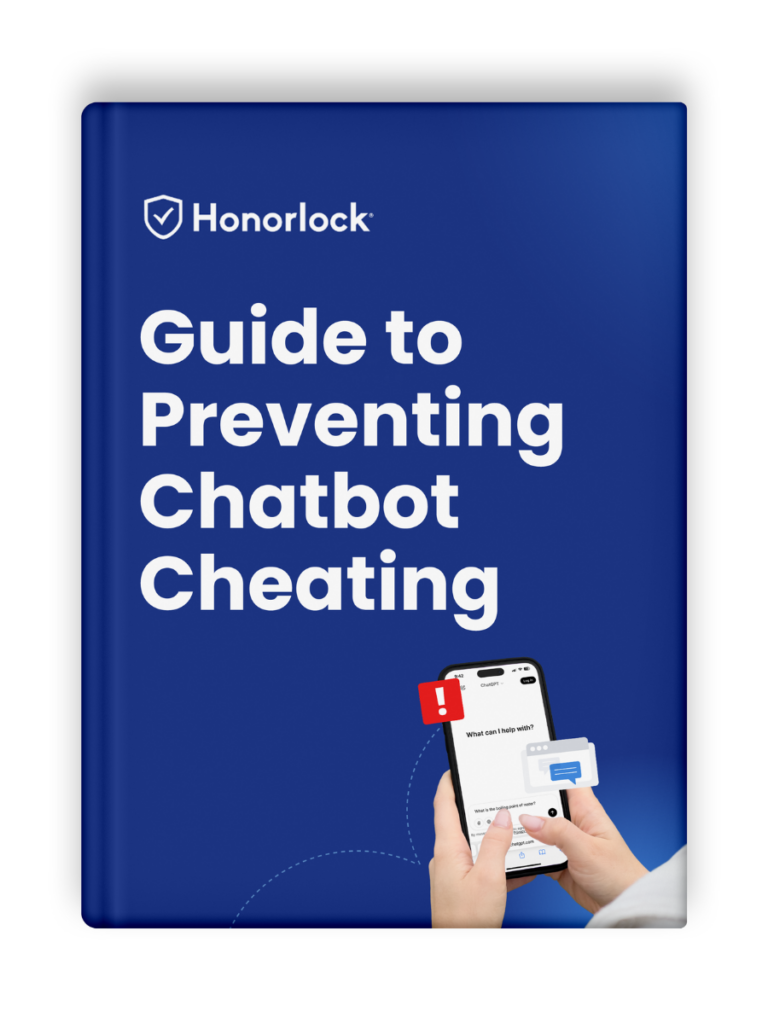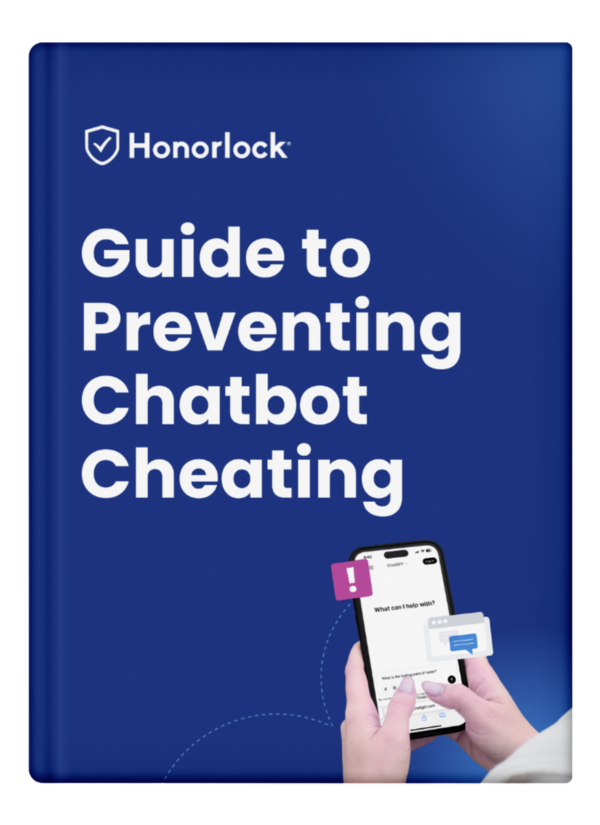It’s tough to detect and prevent cheating on exams, especially online. Students are smart, tech-savvy, and have plenty of tools that make it easier to cheat unless you have the right assessment strategies, proctoring technology, and a deeper understanding of why students cheat beyond obvious reasons like wanting better grades or thinking they can get away with it.
Why do college students cheat on exams?
College students often cheat on exams because they feel unprepared, want better grades, or just because they can get away with it. But beyond the obvious reasons, cheating is complex and has a lot of gray areas.
You can learn more of the real reasons students cheat, but here are three interesting reasons:
Do attitudes and emotions impact cheating?
We like to think that when students have strong beliefs that cheating is wrong, they’ll avoid it, and their moral compass will steer them toward academic integrity. But, that usually isn’t the case. Attitudes, morals, and values impact intentions to cheat, but ultimately, they don’t reduce cheating behavior (Ababneh et al., 2022; Johnson‐Clements et al., 2024; Kasler et al., 2023).
It’s kind of like how we know that driving above the speed limit is illegal, so we don’t intend to speed to the airport… But if you’re running late for a flight, you’ll probably put the pedal to the metal even though you know it’s wrong.
Negative emotions, like anxiety, increase cheating, especially if they expect to perform poorly or aren’t prepared (Eshet et al., 2024; Salgado et al., 2022).
Plagiarism is confusing
Students generally understand plagiarism, but there’s still confusion about how to do it and what information needs to be cited (Larkin & MintuWimsatt, 2015).
Some believe using internet content without citing it is acceptable because it’s publicly available. They also struggle with understanding what qualifies as “common knowledge.” Yale defines common knowledge as knowledge that most educated people already know or can find in an encyclopedia or dictionary. Obviously, there’s a ton of information in those two sources, and Yale acknowledges that the definition of common knowledge is ambiguous and explains that it changes based on the audience.
So, is it still cheating if students genuinely don’t know how or what to cite?
Regardless of whether it’s intentional behavior or an innocent mistake, it needs to be addressed.

Access ebook

Access ebook

Access ebook
They believe others students are cheating and faculty don’t care
When students know their peers are cheating, it begins to feel like normal, acceptable behavior, which makes them more likely to cheat, and it’s easier to justify misconduct (Bath et al., 2014; O’Rourke et al., 2010; Tatum, 2017). The issue is amplified when faculty don’t address cheating, and students begin to think that they don’t care or won’t do anything about it.
Faculty often avoid addressing and reporting cheating for several reasons (MacLeod & Eaton, 2020; Staats et al., 2009):
- Reporting cheating is time-consuming, and faculty often doubt their institution handles misconduct consistently or effectively.
- Evidence of cheating wasn’t conclusive enough.
- Accusing a student of cheating is stressful for both faculty and students.
- Worries about the situation escalating, such as the student denying the accusation or the risk of legal repercussions.
Using assessment strategies and remote proctoring to prevent cheating on online exams
Protect test content from being leaked online
With forums like Reddit and websites like Chegg and Quizlet posing as “homework help,” it’s easy and common for your test content to be leaked online.
One university found that 56% of their exam content was leaked on Chegg. Engineers at the university said, “Alarmingly, we found over half of the audited units had cheating content on Chegg, [which] is broadly used to cheat and 50% of questions asked on Chegg are answered within 1.5 h[ours]. This makes Chegg an appealing tool for academic misconduct in both assignment tasks and online exams.”
Instead of manually searching for individual questions, Search & Destroy™ automatically scans the web for your leaked test content in a few minutes. If it finds any, it shows you where and allows you to send one-click takedown requests. Easy peasy.
Restrict time limits
Unless students require accommodations for additional time, setting strict time limits can help reduce cheating. Several studies found that students take about twice as long to complete unproctored exams compared to students taking proctored exams—which may be because they spend more time searching for answers online during unproctored tests (Alessio et al., 2017; Howard, 2020; Zhang, 2024).
Detect cell phones, smartwatches, and other secondary devices
Cell phones are a huge threat to exam integrity. In fact, it’s the most common way students try to cheat on proctored exams.
Most proctoring services hope a live proctor, who usually watches 10-12 exams at once, will catch a student using a phone in real-time, which isn’t realistic. However, some services take a different approach that uses AI to detect phones and other devices, with a live proctor reviewing it once it’s flagged.
Stop students from using AI during assignments and exams
Students can use AI chatbots like ChatGPT, Claude, and Microsoft Copilot to write about pretty much anything. Unfortunately, using AI detection software won’t really help because once a student changes a few words in the AI-generated text or uses a paraphrasing tool, AI detection is ineffective and inaccurate.
However, there are a few proctoring tools that work together to block unauthorized AI during exams and assignments.
In addition to using proctoring to block AI chatbots, you can also use:
- Authentic assessments for students to prove they can apply what they’ve learned to complete projects and tasks in real-world situations.
For example, instead of asking nursing students to answer a series of multiple-choice questions, an authentic assessment may ask them to record a short video where they identify the parts of a stethoscope and demonstrate how to use it while explaining what they’re doing.
- Assignments tied directly to in-class content, such as creating a short essay that compares and contrasts two peer discussion posts or a personal reflection on the results of an in-class survey.
Example assignment connected to class: Select two peer responses from last week’s discussion posts, each focusing on a different learning theory. Write a 2-page comparison of their similarities and differences, then create a simple visual (mind map, concept map, or infographic) to show how your own response aligns with or differs from the two you chose.
- Scaffolded assignments that break larger assignments into a series of smaller assignments. For example, replace a single, long-form research paper with smaller assignments like brainstorming topics, submitting a proposal and outline, and writing a draft for peer review before writing the final research paper. You can also ask for a reflective component. Similar to the Ask students to submit each step in a different format, such as a mind map for brainstorming, a concept map for the proposal/outline, and a voice-over presentation for the reflection.
Help reduce students’ test anxiety
Tests are naturally stressful for most people, and they can increase anxiety. And when anxiety increases, some students are more likely to cheat (Eshet et al., 2024).
Practical tips for faculty to help reduce student test anxiety:
- Clearly explain what the test covers, question types, time limit, grading criteria, etc.
- Show how to use any technologies (include a demonstration if possible.)
- Provide practice exams to test technology and devices.
- Review the rules and answer any questions.
- Share technical support contact information and details on how to access it.
- Explain available accommodations and how to request them.
Monitor behavior from all angles
Another thing to consider is how you’ll monitor student behavior during online exams, such as:
- Video monitoring, which can include a second/side camera, so you can see if they’re trying to look at their notes and use other resources during the test.
- Smart Speech detection (not sound detection) so you can tell if they’re talking to someone else in the room or asking Siri for help, but not have to review flags for unimportant noises like coughing or a doorbell ringing.
- Locking the browser and recording their screen to see if they try to access other websites or attempt to copy and paste questions into a document.
Verify that it’s the right person taking the test
Online proctoring systems can help verify identity by capturing a photo of both the test taker and their ID. This way, you’ll know that the person taking the proctored exam is getting credit for the online course.
References
Ababneh, K. I., Ahmed, K., & Dedousis, E. (2022). Predictors of cheating in online exams among business students during the Covid pandemic: Testing the theory of planned behavior. The International Journal of Management Education, 20(3), 100713. https://doi.org/10.1016/j.ijme.2022.100713
Alessio, H. M., Malay, N., Maurer, K., Bailer, A. J., & Rubin, B. (2017). Examining the Effect of Proctoring on Online Test Scores. Online Learning, 21(1). https://doi.org/10.24059/olj.v21i1.885
Bath, M., Hovde, P., George, E., Schulz, K., Larson, E., & Brunvatne, E. (2014). Academic integrity and community ties at a small, religious-affiliated liberal arts college. International Journal for Educational Integrity, 10(2), 31–43. https://doi.org/10.21913/IJEI.v10i2.1005
Eshet, Y., Grinautsky, K., & Steinberger, P. (2024). To behave or not (un)ethically? The meditative effect of mindfulness on statistics anxiety and academic dishonesty moderated by risk aversion. International Journal for Educational Integrity, 20(1), 6–18. https://doi.org/10.1007/s40979-024-00151-w
Howard, D. (2020). Comparison of exam scores and time taken on exams between proctored oncampus and unproctored online students. Online Learning, 24(4), 204-228. https://doi.org/10.24059/olj.v24i4.2148
Johnson-Clements, T. P., Curtis, G. J., & Clare, J. (2024). Testing a Psychological Model of Post-Pandemic Academic Cheating. Journal of Academic Ethics. https://doi.org/10.1007/s10805-024-09561-4
Kasler, J., Sharabi-Nov, A., Shinwell, E. S., & Hen, M. (2023). Who cheats? Do prosocial values make a difference? International Journal for Educational Integrity, 19(1), 6–16. https://doi.org/10.1007/s40979-023-00128-1
Larkin, C., & Mintu-Wimsatt, A. (2015). Comparing cheating behaviors among graduate and undergraduate online business students. Journal of Higher Education Theory and Practice, 15(7), 54–62.
MacLeod, P. D., & Eaton, S. E. (2020). The Paradox of Faculty Attitudes toward Student Violations of Academic Integrity. Journal of Academic Ethics, 18(4), 347–362. https://doi.org/10.1007/s10805-020-09363-4
O’Rourke, J., Barnes, J., Deaton, A., Fulks, K., Ryan, K., & Rettinger, D. A. (2010). Imitation Is the Sincerest Form of Cheating: The Influence of Direct Knowledge and Attitudes on Academic Dishonesty. Ethics & Behavior, 20(1), 47–64. https://doi.org/10.1080/10508420903482616
Salgado, J. F., Cuadrado, D., & Moscoso, S. (2022). Counterproductive Academic Behaviors and Academic Performance: A Meta-Analysis and a Path Analysis Model. Frontiers in Psychology, 13, 893775–893775. https://doi.org/10.3389/fpsyg.2022.893775
Staats, S., Hupp, J. M., Wallace, H., & Gresley, J. (2009). Heroes Don’t Cheat: An Examination of Academic Dishonesty and Students’ Views on Why Professors Don’t Report Cheating. Ethics & Behavior, 19(3), 171–183. https://doi.org/10.1080/10508420802623716
Tatum, H., & Schwartz, B. M. (2017). Honor Codes: Evidence Based Strategies for Improving Academic Integrity. Theory into Practice, 56(2), 129–135. https://doi.org/10.1080/00405841.2017.1308175
Zhang, N., Larose, J., & Franklin, M. (2024). Effect of unproctored versus proctored examinations on student performance and long-term retention of knowledge. The Journal of Chiropractic Education. https://doi.org/10.7899/JCE-23-16
